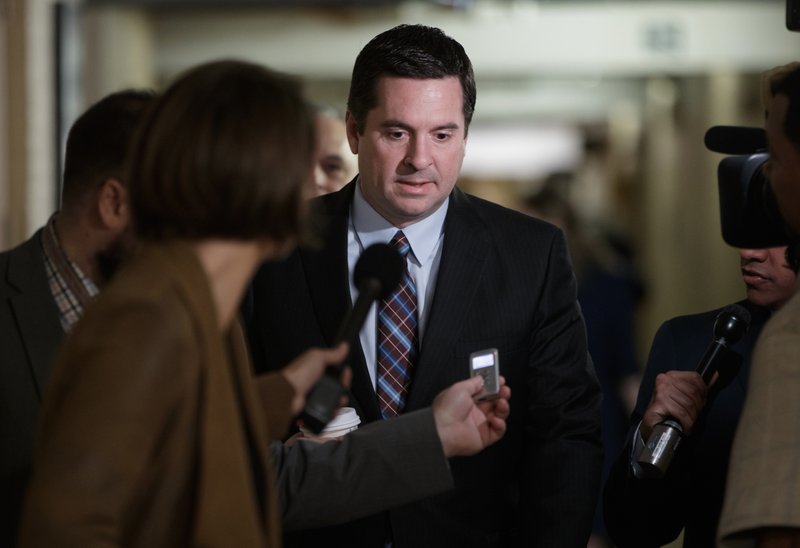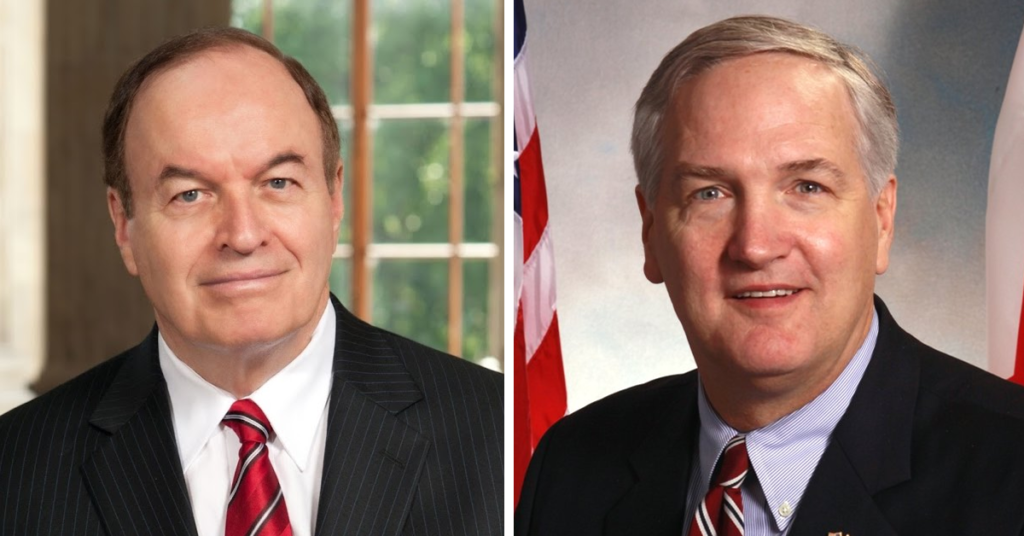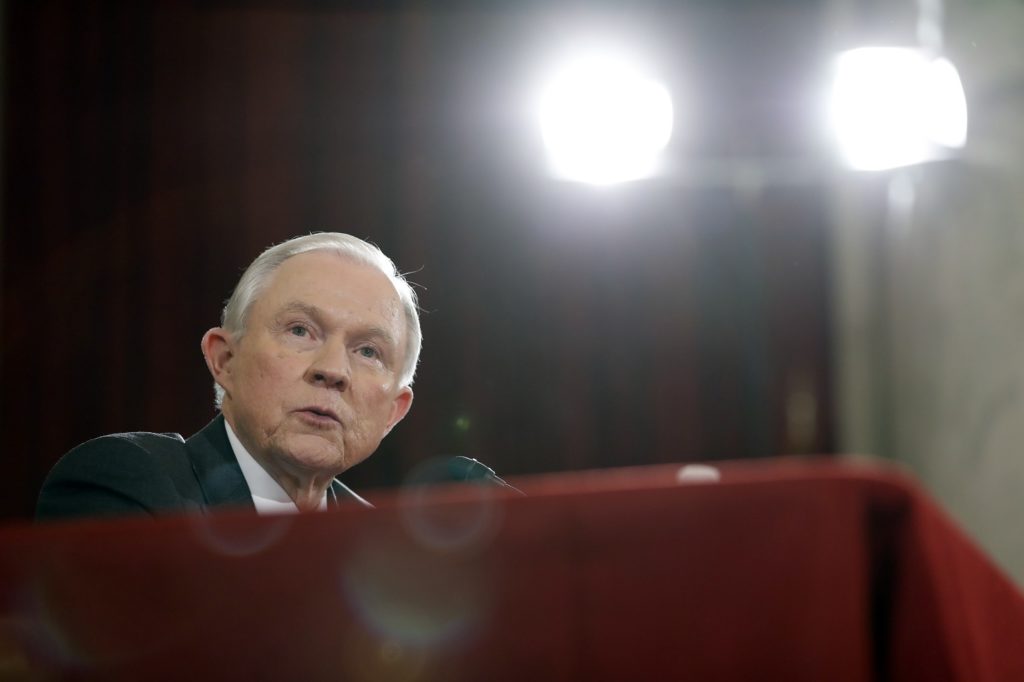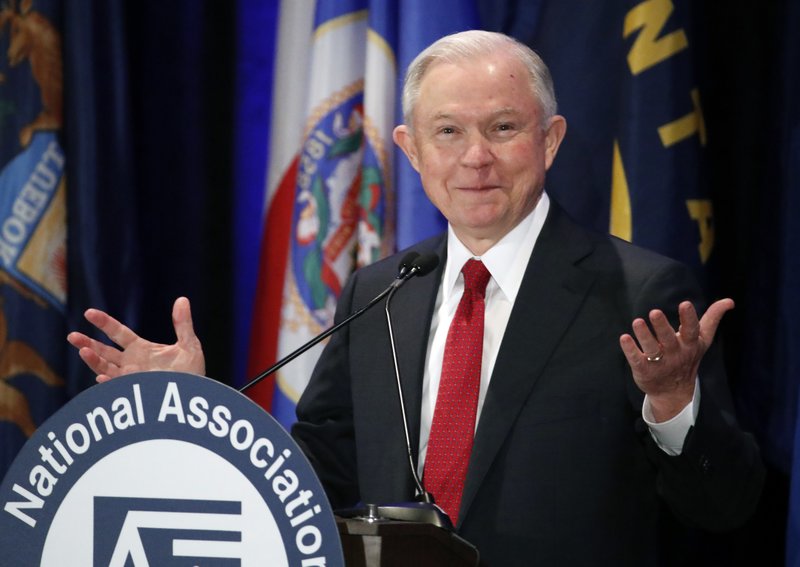Head of Trump-Russia probe under fire, won’t step down

The chairman of the House intelligence committee is refusing to step away from its investigation of Russian meddling in the 2016 election, as fresh political allegations bring new cries of protest from Democrats. Asked Tuesday if he should recuse himself, committee chairman Devin Nunes responded, “Why would I?” Later in the day, the White House vehemently denied a report that it had sought to hobble the testimony of a former acting attorney general before Nunes canceled the hearing where she was to speak. President Donald Trump‘s spokesman, Sean Spicer, lashed out at reporters, claiming they’re seeing conspiracies where none exist. “If the president puts Russian salad dressing on his salad tonight, somehow that’s a Russian connection,” he suggested. The embattled House committee is conducting one of three probes into the election campaign, its aftermath and potential contacts between Trump officials and Russians. The Senate intelligence committee is doing its own investigation, and since late July the FBI has been conducting a counterintelligence investigation into Russia’s meddling and possible coordination with the Trump campaign. Nunes’ decision to cancel Tuesday’s hearing was the latest in a series of actions that Democrats contend demonstrate that his loyalty to Trump is greater than his commitment to leading an independent investigation. The California Republican, who was a member of Trump’s presidential transition team, has said he met with a secret source last week on White House grounds to review classified material that showed Trump associates’ communications had been captured in “incidental” surveillance of foreigners in November, December and January. Nunes would not name the source of the information, and his office said he did not intend to share it with other members of the committee. Nor would he disclose who invited him on the White House grounds for the meeting. He described the source as an intelligence official, not a White House official. In an interview on CNN, he suggested the president’s aides were unaware of the meeting. Trump has used Nunes’ revelations to defend his unproven claim that Barack Obama tapped phones at Trump Tower. Adding to the swirl of questions was the publication of a series of letters dated March 23 and March 24 involving a lawyer for former Acting Attorney General Sally Yates. Yates, along with former CIA Director John Brennan and former director of national intelligence James Clapper, had agreed to testify publicly before the House intelligence committee. The canceled hearing would have been the first opportunity for the public to hear Yates’ account of her role in the firing of Trump’s first national security adviser, Michael Flynn. The letters from lawyer David O’Neil, published by The Washington Post, appeared to be in response to a meeting O’Neil had at the Justice Department on March 23 in advance of the hearing. In them, O’Neil pushes back against what he says is Justice Department guidance on what Yates could say about conversations she had with Trump — conversations the department indicated could be covered by executive privilege. “We believe that the Department’s position in this regard is overbroad, incorrect, and inconsistent with the Department’s historical approach to the congressional testimony of current and former senior officials,” O’Neil wrote in a March 23 letter to Justice Department official Samuel Ramer. He also wrote that Yates’ testimony would cover details that others have publicly recounted. The Justice Department responded to O’Neil saying that the question of what privileged conversations Yates could discuss was ultimately up to the White House. Spicer on Tuesday said the White House never sought to stop her. “We have no problem with her testifying, plain and simple,” he said. O’Neil declined to comment Tuesday, and a Justice Department spokeswoman did not return a message seeking comment. Yates was fired in January as acting attorney general after she refused to defend the Trump administration’s first travel ban. She alerted the White House in January that Flynn had been misleading in his account of a December phone call with the Russian ambassador to the United States in which economic sanctions against Russia were discussed. Flynn was ousted after those discrepancies were made public. Virginia Sen. Mark Warner, the top Democrat on the Senate intelligence committee, said that White House meddling is not helping to “remove the cloud that increasingly is getting darker over the administration.” Democratic members of Nunes’ House committee said his ability to lead a bipartisan probe is compromised. “It’s irregular, to be benign about it, to have a lead investigator kibitzing with the people being investigated,” said Rep. Jim Himes, D-Conn. House Speaker Paul Ryan reiterated his support for Nunes, and Nunes himself said all of the controversy was standard for Washington. “It’s the same thing as always around this place — a lot of politics, people get heated, but I’m not going to involve myself with that,” he said. Republished with permission of The Associated Press.
Alabama’s senators stand by Jeff Sessions amid Russia criticism

Alabama’s senior U.S. Sen. Richard Shelby offered public support to his former colleague turned Attorney General, Jeff Sessions, on Thursday following reports the former Alabama senator intentionally misled his colleagues during his confirmation hearings about about meeting with the Russian ambassador. “This afternoon I watched Attorney General Sessions’ press conference where he thoroughly explained his responses to the Judiciary Committee,” said Shelby. “As I have said before, I hold Jeff’s integrity in the highest regard and his action solidifies my respect for his leadership.” Shelby, a Republican said he believed Sessions committed no wrongdoing. “I firmly believe that Jeff has committed no wrongdoing and his statement today proves as much. Attorney General Sessions’ decision to recuse himself was wise, and I fully support him,” Shelby concluded. Luther Strange, Alabama’s newly minted senator who filled Sessions vacant seat, echoed Shelby’s support saying the attacks against Sessions are baseless. “Today’s attacks are ugly, and they are entirely baseless,” Strange said in a statement. “Here are the facts: Jeff Sessions has a proven record as a national security watchdog who is tough on Russia. As every Democrat who is criticizing Jeff Sessions knows, meetings between Senators and foreign ambassadors happen nearly every day – they are part of the job, especially for a senior member of the Armed Services Committee.” West Virginia-Democrat U.S. Sen. Joe Manchin went on record Thursday saying he too has met with Russian ambassadors, saying that meetings were “not unusual.” Manchin added it’s typical for senators to “meet with all the ambassadors” to establish a relationship with them and “know where in the world people are coming from.” A ForeignPolicy.com reporter Tweeted Thursday that over 30 Senate Democrats had also met with Russian diplomats. Strange now hopes other Democrats will see their hypocrisy and leave Sessions alone in order to get back to the people’s work. “I am calling on Congressional Democrats to stop this witch hunt and join Republicans in the business of doing what the American people sent us here for – fixing our economy, securing our border, and strengthening our national security,” Strange concluded.
Questions and answers about perjury, Jeff Sessions’ statements

Attorney General Jeff Sessions agreed Thursday to recuse himself from any investigation into Russian interference in the 2016 presidential election. The move came after revelations that Sessions twice spoke with the Russian ambassador during the campaign, a fact that seemingly contradicts sworn statements he made to Congress during his confirmation hearings. Sessions rejected any suggestion that he tried to mislead anyone about his contacts with the Russian, but added that he “should have slowed down and said ‘but I did meet with one Russian official a couple of times.’” Some Democrats demanded an investigation into whether Sessions committed perjury. But perjury is difficult to prove, and experts say Sessions would have a good defense if he needed one. Some questions and answers about the allegations: ___ IS THIS A CASE OF PERJURY? That’s tough to say. Such a case would likely come down to splitting hairs over what Sessions said under oath, what he believed he was saying, and what he believed he was being asked. During Sessions’ confirmation hearing in January, Sen. Al Franken, D-Minn., asked the then-Alabama senator what he would do if evidence emerged that anyone from the Trump campaign had been in touch with the Russian government during the 2016 race. Sessions replied he was “not aware of any of those activities” and that he himself, sometimes called a campaign surrogate, “did not have communications with the Russians.” Franken on Thursday said Sessions’ response to his query was “at best, misleading.” House Democratic Leader Nancy Pelosi of California accused him of “lying under oath.” House Judiciary Committee Democrats sent a letter to FBI Director James Comey calling for a criminal investigation. Justice Department spokeswoman Sarah Isgur Flores said Sessions’ answer was not misleading because he believed he was being asked about communications between Russia and the Trump campaign, not about those he had as a senator. The disagreement underscores the difficulty in proving someone has committed perjury. Prosecutors must show not only that a person spoke falsely but that he intended to be misleading about an indisputable fact. Sessions said Thursday said he didn’t mean to mislead lawmakers. “That is not my intent,” he said. “That is not correct.” Sessions could reasonably argue he thought he was being asked about his campaign-related contacts as opposed to congressional or diplomatic contacts, said Benjamin Wittes, a senior Brookings Institution fellow. “He may have just screwed up,” said Wittes. “It’s not a crime to be wrong under oath.” An ambiguous question can kill a perjury case, which is why so few materialize from testimony given before Congress. Lawmakers “are not the most precise questioners. It’s not like a deposition or grand jury, where a professional prosecutor is asking the questions,” said Stanley Brand, a Washington attorney and former House general counsel. “Inartful questions and elusive answers. You have to pursue those.” But, as Senate Democratic leader Chuck Schumer pointed out, Sessions could have corrected the record in the weeks after his confirmation hearing. Sessions said Thursday he would be sending the Senate Judiciary Committee a letter doing that. ___ COULD HE BE CHARGED WITH MAKING ‘FALSE STATEMENTS’? Sen. Patrick Leahy, the senior Judiciary Committee Democrat, asked Sessions in a written questionnaire whether “he had been in contact with anyone connected to any part of the Russian government about the 2016 election, either before or after Election Day.” Sessions replied with one word: “No.” That statement could be examined under a separate “false statements” statute, which differs from perjury in that it applies to statements that are not made under oath. But prosecutors would still have to prove Sessions knowingly and willfully gave a misleading answer. ___ WHAT HAS SESSIONS HIMSELF SAID ABOUT PERJURY? The House impeached Bill Clinton after he had been accused of lying to a grand jury about his relationship with White House intern Monica Lewinsky. As a senator Sessions voted for conviction on a count of perjury and a count of obstruction. Clinton was acquitted. “It is crucial to our system of justice that we demand the truth,” Sessions said after Clinton’s acquittal in 1999. “I fear that an acquittal of this president will weaken the legal system by providing an option for those who consider being less than truthful in court. Whereas the handling of the case against President Nixon clearly strengthened the nation’s respect for law, justice and truth, the Clinton impeachment may unfortunately have the opposite result.” ___ WHAT ARE SOME OTHER RECENT CASES? Republicans asked for a perjury investigation of Hillary Clinton for telling Congress there was nothing in her private email marked classified. That was not accurate, but FBI Director James Comey said it was “possible that she didn’t understand what a ‘C’ meant when she saw it in the body of the email like that,” which would hurt a perjury case. The Justice Department in 2013 rejected Republican suggestions that Attorney General Eric Holder committed perjury when he told Congress he had never been involved in a potential prosecution of the news media. Republished with permission of The Associated Press.
Donald Trump says no reason for Jeff Sessions to leave Russia probe

A growing number of Republicans joined Democratic leaders Thursday in calling for Attorney General Jeff Sessions to step aside from an investigation into Russian interference in the 2016 White House election. President Donald Trump said there was no need and he retains “total” confidence in Sessions. Top Democrats demanded that Sessions go further than merely stepping aside from any investigations. They’re calling for him to resign as the nation’s top law enforcement officer after the revelation that he had twice talked with Moscow’s U.S. envoy during the presidential campaign. Sessions’ conversations with Ambassador Sergey Kislyak seem to contradict his sworn statements to Congress during his confirmation hearings. House Democratic leader Nancy Pelosi accused Sessions of “lying under oath,” and she and Senate Democratic leader Chuck Schumer said he should depart. Schumer said the Justice Department should appoint a special prosecutor to examine whether the federal investigation into the Kremlin’s meddling in the U.S. election has been compromised by Sessions. “If there was nothing wrong, why don’t you just tell the truth?” Schumer said of sessions. “It was definitely extremely misleading to say the least” “I have said that, when it’s appropriate, I will recuse myself” from the investigation, Sessions told MSNBC on Thursday. Trump, asked if Sessions should recuse himself, said Thursday, “I don’t think so.” He was questioned in Newport News, Virginia, where he was speaking aboard a new aircraft carrier. While there is nothing unusual or necessarily nefarious about a member of Congress meeting with a foreign ambassador, senators from the Foreign Relations Committee typically meet with ambassadors rather than lawmakers from the Armed Services Committee, whose responsibility is oversight of the military and the Pentagon. Congressional contact with Russian officials was limited for much of last year because of Russia’s invasion of Crimea and Moscow’s close relationship with Syria, a pariah for much of the West. At least three House Republicans — Reps. Jason Chaffetz of Utah, Darrell Issa of California and Tom Cole of Oklahoma — have said they want Sessions to withdraw from investigation of campaign contacts with the Russians. And GOP Sen. Rob Portman of Ohio said that while Sessions was a former colleague and a friend, “I think it would be best for him and for the country to recuse himself.” The attorney general “is going to need to recuse himself at this point,” Chaffetz, chairman of the House Oversight and Government Reform Committee, told MSNBC. House Majority Leader Kevin McCarthy, R-Calif, said he thought Sessions “needs to clarify what these meetings were.” He said it isn’t unusual for members of Congress to meet with ambassadors, but he added that if a question arose about the integrity of a federal investigation, “I think it’d be easier” for an attorney general to step away. House Speaker Paul Ryan said Sessions should only recuse himself if he is a subject of the probe. Sessions, an early supporter of Trump’s candidacy and a policy adviser during the campaign, was asked during his confirmation hearing in January what he would do if “anyone affiliated” with the campaign had been in contact with officials of the Russian government. Sessions replied that he had not had communications with the Russians, and answered “no” in a separate written questionnaire when asked about contacts regarding the election. In a statement late Wednesday, he said: “I never met with any Russian officials to discuss issues of the campaign. I have no idea what this allegation is about. It is false.” White House spokeswoman Sarah Huckabee Sanders called the disclosure of the talks with Kislyak “the latest attack against the Trump administration by partisan Democrats.” She said Sessions “met with the ambassador in an official capacity as a member of the Senate Armed Services Committee, which is entirely consistent with his testimony.” Sessions had more than 25 conversations with foreign ambassadors last year in his role as a U.S. senator and senior member of the Armed Services Committee, and had two separate interactions with Kislyak, the department confirmed. One was a visit in September in his capacity as a senator, similar to meetings with envoys from Britain, China, Germany and other nations, the department said. The other occurred in a group setting following a Heritage Foundation speech that Sessions gave during the Republican National Convention, when several ambassadors — including the Russian — approached him after the talk as he was leaving the stage, according to the department. Dmitry Peskov, the spokesman for Russian President Vladimir Putin, said he did not know about the meetings but it was normal for Russian diplomats to meet with U.S. lawmakers. Likewise, a spokeswoman for the Russian Foreign Ministry, Maria Zakharova, told AP that meetings with American political figures were part of the embassy’s “everyday business.” Revelations of the contacts, first reported by The Washington Post, came amid a disclosure by three administration officials that White House lawyers have instructed aides to Trump to preserve materials that could be connected to Russian meddling in the American political process. The officials who confirmed that staffers were instructed to comply with preservation-of-materials directions did so on condition of anonymity because they were not authorized to publicly disclose the memo from White House counsel Don McGahn. At the confirmation hearing in January, Sen. Al Franken, D-Minn., asked Sessions about campaign contacts. “I have been called a surrogate at a time or two in that campaign and I didn’t have, did not have communications with the Russians, and I’m unable to comment on it.” Republished with permission of The Associated Press.
Jeff Sessions recuses himself from Russia inquiry

Attorney General Jeff Sessions on Thursday recused himself from overseeing any federal investigation into charges that Russia interfered in the 2016 presidential election. Speaking at a Department of Justice press conference, the former Alabama Senator said he was following the advice of his staff. “I have now decided to recuse myself from any existing or future investigations of any matter relating in any way to the campaign for president of the United States,” Sessions said. “This announcement should not be interpreted as confirmation of the existence of any investigation or suggestive of the scope of any such investigation.” “They said that since I had involvement with the campaign, I should not be involved in any campaign investigation,” he added. Moving forward, the department’s second-highest ranking official, the deputy attorney general will ll handle all campaign-related investigations. For now that’s long-time federal prosecutor, Acting Deputy Attorney General Dana Boente. Boente will serve in the position until President Donald Trump’s permanent nominee for the post, Rod Rosenstein, has him confirmation hearing on March 7. On Wednesday, Sessions came under intense fire following a Washington Post report that claimed he spoke with Russian Ambassador Sergey Kislyak during the presidential campaign, then denied any meetings under oath during his confirmation hearing. The White House is standing behind Sessions and his decision.
New Congress poised to greet Donald Trump with Russia probes

Congress’ Republican leaders are preparing to greet incoming President Donald Trump with investigations into whether Russia intruded into last month’s elections to help him win the White House. Senate Majority Leader Mitch McConnell declined to say Monday whether he agreed with the CIA assertion that Russian hacking and public release of Democrats’ emails during the presidential campaign were designed to aid Trump. But in a noteworthy departure from Trump’s rejection of that conclusion, the Kentucky Republican said the Senate Intelligence Committee would probe the issue. “It’s an important subject, and we intend to review it on a bipartisan basis,” McConnell said. House Speaker Paul Ryan, R-Wis., endorsed an ongoing investigation by the House Intelligence Committee into cyberthreats from other countries and extremist groups and condemned “any state-sponsored cyberattacks on our democratic process.” He said that examination would continue, with his support. “Any intervention by Russia is especially problematic because under President (Vladimir) Putin, Russia has been an aggressor that consistently undermines American interests,” Ryan said in a written statement after McConnell met with reporters. The remarks by McConnell and Ryan drew a contrast with Trump’s oft-repeated praise of Putin and the president-elect’s scoffing at the CIA’s findings. Trump on Sunday called the CIA’s contention “ridiculous” and blamed the disclosures of the agency’s assessment on Democrats who he said were embarrassed over losing last month’s election. McConnell said he has “the highest confidence” in U.S. intelligence agencies. He recounted Russia’s annexation of Crimea from Ukraine in 2014, said Baltic nation leaders are nervous about Moscow and pointedly praised NATO, the alliance that Trump criticized repeatedly during his campaign. “I think we ought to approach all of these issues on the assumption that the Russians do not wish us well,” McConnell said. Besides embracing an investigation by the Senate’s intelligence panel, led by Richard Burr, R-N.C., McConnell also expressed support for a related probe by the Armed Services Committee, chaired by Sen. John McCain, R-Ariz. McCain has been calling for such an examination and has long been wary of Russia. The chairman of the House Intelligence Committee, Rep. Devin Nunes, R-Calif., released a letter Monday to National Intelligence Director James Clapper complaining that recent reports of the CIA’s conclusion clashed with Clapper’s prior statement to the panel that he lacked “good insight” about the connection between Russian hacking of Democratic campaign documents and their release by Wikileaks. Nunes requested a briefing on the subject for this week. The GOP leaders expressed their views after a weekend in which Trump also said he would not need daily intelligence briefings, a staple of presidents’ days for decades and a flouting of a convention common for presidential transitions. The campaign chairman for defeated Democratic presidential candidate Hillary Clinton urged the Obama administration Monday to reveal what it knows about any Russian efforts to help Trump win. John Podesta, whose emails were stolen and posted online, said the administration “owes it to the American people” to release details of the intrusions, which included the hacking of Democratic Party files. Podesta said the Clinton campaign also supports a call by 10 of the 538 members of the Electoral College for Clapper to provide information that intelligence agencies have gathered on the subject. Republished with permission of the Associated Press.


